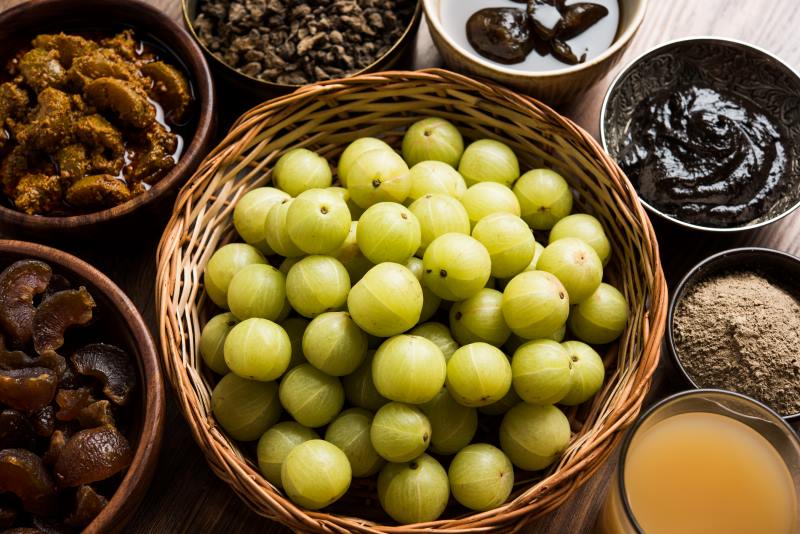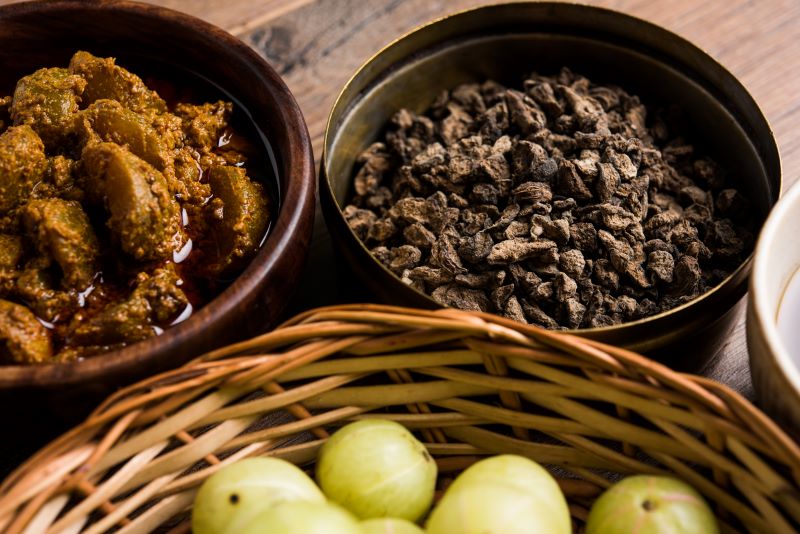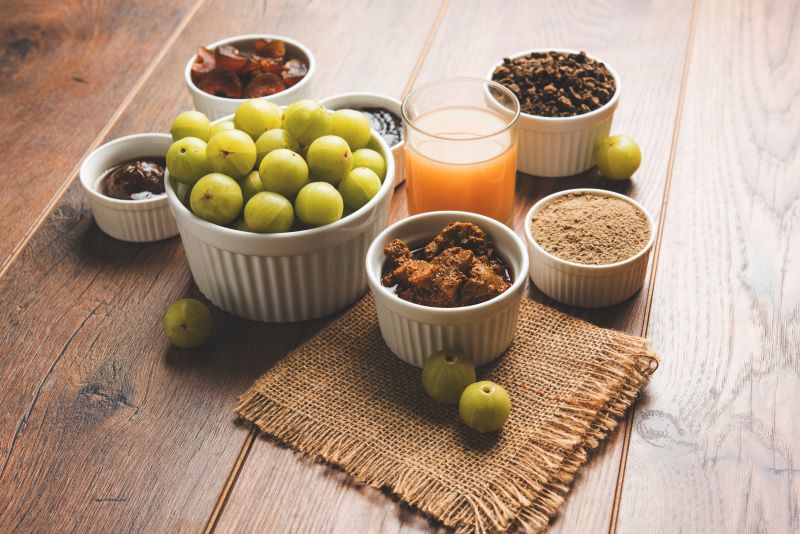16 Benefits of Amla with Nutritional Values

ndian gooseberry, popularly known as Amla, is known for preventing diseases as it is rich in antioxidants, amino acids, vitamins, minerals, dietary fibre and polyphenols. If you include this super fruit in your diet, then it can improve your hair, skin and overall health.
Are you keen to know the health benefits of amla?
If yes, keep reading this article as it highlights its health benefits and other essential details.

Table of Contents

Top 16 Health Benefits of Amla

The antioxidants and vitamins found in Amla berries offer several health benefits. Mentioned below are the benefits that you can get by including Amla in your diet:
1. Improves Immunity
One of the most significant advantages of eating amla is that it improves your immune system. This is because it has high amounts of vitamin C, an antioxidant that decreases inflammation and reduces cell damage. Furthermore, it helps to form immune cells and antibodies that destroy pathogens.
2. Reduces Blood Sugar
Amla has a mineral called chromium that helps to regulate blood sugar levels. Chromium increases insulin sensitivity and aids in reducing sugar levels in your bloodstream.
3. Boosts Brain Health
Phytonutrients in Amla assist in combating free radicals that cause damage to brain cells. Moreover, being rich in antioxidants, it also improves memory and the overall functioning of your brain.
4. Improves Hair Condition
Amla is rich in amino acids, vitamin C, fatty acids and tannins that help to nourish your hair. Applying Amla oil to your hair can strengthen hair follicles and prevent dandruff. Moreover, it increases hair growth, prevents greying of hair at a premature age, and naturally conditions your hair.
5. Improves Digestion
Amla has fibres that maintain bowel movement and reduces digestive issues such as diarrhoea and constipation. It also increases the production of gastric juices, which help to improve digestion and promote quick absorption of food, thus preventing acidity.
6. Maintains Healthy Skin
Amla is a rich source of collagen protein that helps to keep your skin soft and firm. Furthermore, the antioxidants in the herb help to decrease wrinkles and slow down ageing.Studies have revealed that adding Amla extract or powder to your diet can increase hydration of the outermost layer of skin.
7. Improves Eyesight
Eating amla is beneficial in decreasing the risk of developing glaucoma, cataracts and age-related macular degeneration. It also helps to prevent conjunctivitis and takes care of the overall eye health.
8. Maintains Heart Health
Vitamin C in Amla is excellent for maintaining your heart health. It lessens the risk factors associated with cardiovascular diseases, including LDL or bad cholesterol, triglycerides and hypertension. It also combats oxidative stress that causes heart injury, decreases inflammation linked with heart disease and prevents the development of blood clots that result in stroke and heart attack.
9. Increases Iron in Body
Amla has a high content of iron. This helps increase the amount of haemoglobin in red blood cells in the body. Amla is a good source of vitamin C that aids in iron absorption in the body. Research has shown that regular intake of Amla juice can raise iron and haemoglobin levels.
10. Increases Bone Strength
Amla has high amounts of calcium that helps in building and strengthening bones. In addition, its anti-inflammatory properties decrease inflammation, reducing swelling and pain in joints caused due to arthritis. You can also consume Amla to treat bone diseases such as osteoporosis.
11. Aids Weight Loss
A protein in Amla reduces cravings, thus promoting weight loss. Additionally, you can eat the fruit without worrying about weight gain as it is low in fat and carbohydrates. Nutritionists claim that amla improves metabolism, helping to shed weight faster, and since it contains tannic and fibres, it also prevents constipation and reduces bloating.
12. Boosts Liver Function
Amla juice has high amounts of phytochemicals such as gallic acid, quercetin, ellagic acids and corilagin. All of these help to protect your body from free radicals and detoxify it. It improves your liver functioning and gives you energy all day long.
13. Balances Hormones
Amla eliminates toxins from your body, controls the menstrual cycles, and improves hormonal functioning and fertility in women. It further combats adverse effects of PCOS on your health, such as unwanted hair growth and obesity.
14. Anti-inflammatory Activity
Amla is rich in bioactive compounds, which make it a strong anti-inflammatory agent. It contains ingredients such as flavonoids and vitamin C that help to lessen inflammation. This can help treat inflammatory ailments such as asthma, bronchitis, and arthritis.
15. Better Respiratory Health
Amla, rich in Vitamin C, helps soothe air pathways and improve respiratory health by reducing symptoms associated with bronchitis or asthma. In this manner, it unblocks airway passages, lowering mucus production while maintaining immunity.
16. Supports Kidney Function
Amla has a diuretic effect, hence enhancing urine production, which then facilitates the elimination of toxins from our bodies. For example, it is very effective for renal health because it prevents the formation of kidney stones while maintaining a normal state of renal function.
How to Use Amla?

You can find Amla easily in the Indian markets, mostly from April to December. The best way to get the health benefits of Amla is by the following ways:
Amla Juice
Drink its juice, although you can also eat it raw. Make fresh Amla juice by putting the fruit in a blender and strain it. Drink it when you wake up for optimal health benefits, or mix it with other juices to get more nutrients.
Dry Amla
You can also have Amla after drying it. All you need to do is deseed and chop this superfruit into small pieces. Then, sprinkle some salt and let it dry in the sunlight for some days. Once it becomes dehydrated, store these dried Amlas in an airtight jar and eat it as a snack.
Amla Candy
However, if you cannot handle the sour taste of the juice or raw Amla, you can try eating it in candied or pickled form. Dry Murrel candy, heavily sweetened with sugar/honey, is a popular type of snack that children love most because of its chewy texture.
Amla Powder
Besides, Amla supplements are available as powder-filled capsules and Amla fruit powder. You can use this powder to make tea or add it to your smoothies or other drinks. Amla powder can be added to shakes, yoghurt, oatmeal, etc.
Amla Face Mask
Moreover, this fruit's extracts are also used in skincare and hair products due to the presence of antioxidant properties and vitamin C. Mix Amla with yoghurt, honey, or water to make a natural face mask which you then apply on your face.
Amla Hair Pack
One ingredient in the manufacture of healthy hair packs is mixing Amla powder with henna, coconut oil, or yogurt, among others. Apply to hair and scalp for 30-60 minutes before rinsing out.
Amla Oil
Amla oil is an effective remedy for hair problems. Massage it into your scalp and on your locks to help strengthen follicles, reduce dandruff, and stimulate hair growth. Keep the mixture overnight or for some hours before rinsing off.
What are the Nutritional Values of Amla?

Amla, with its exciting health benefits, also packs many nutrients in it. Below is a table that shows the nutritional values of Amla:
Check Other Important Health Metrics Now
What are the Side Effects of Using Amla?
Amla offers several health benefits but can affect your health if consumed excessively. Here are the following side effects that you can see on your health if you don't take precautions while eating Amla:
Hinders Blood Clotting
The high amount of vitamin C present in Amla can affect blood coagulation. Overdose might hinder the formation of clots and thereby increase bleeding risks, especially for patients using anticoagulants. Also, it's essential to consult healthcare professionals should you have clotting disorders or are on anticoagulant therapy.
Trigger Acidity
Amla is sour tasting and hence can cause an increase in the production level of gastric acids, which often leads to acidity or heartburn. Thus, those with sensitive stomachs or gastrointestinal problems should consume it moderately. Ingesting Amla together with other foods is recommended to lessen this effect.
Hardens the Stool
Amla has a high fibre content that promotes digestion. However, excessive use may result in the hardening of stool and constipation. This is more worrying when little water intake accompany the process. To avoid dehydration, keep hydrating while on an Amla diet with plenty of water sips.
Dehydration
Dehydration might ensue if there is limited water intake, given the high diuretic properties of Amla, which increase urine production. Consequently, you may experience symptoms like dry mouth, dizziness, and fatigue. You are advised to always be hydrated every time you take Amla in any form.
Dryness and Ageing
Excessive consumption can lead to dryness in the skin and premature ageing. Its high proportion of Vitamin C may inhibit skin moisture, making it dry if used excessively for skin care. Wrinkles appear faster than other signs of early old age when there are not enough oils due to overuse.
Chances of Hairfall
Excessive eating can lead to hair fall. Amla is recognised as a hair booster; however, overconsumption might result in an unbalanced diet. This disorder of nutrients can lead to thinning hair and excessive hair loss. Therefore, it is necessary to eat the right quantities of Amla and take care of general hair health by eating well-balanced food.
What are the Precautions for Using Amla?
Before adding Amla to your healthcare routine, you must be careful and take the necessary steps. Take the following precautions while including Amla in your diet:
Who Should Avoid Using Amla?
Although having various benefits, avoid eating Amla if you have the following medical condition or are going through a specific procedure:
Medical History of Hyperacidity.
Individuals with a record of hyperacidity or acid reflux should avoid taking Amla since its acidic nature can worsen these conditions. The high vitamin C content can lead to stomach acid production, which is uncomfortable and worsens the symptoms. It's prudent, therefore, to seek medical advice before including ama in the diet.
Suffering from Blood-Related Disorders.
If you are suffering from blood-related disorders like anaemia or haemophilia or are taking anticoagulant medication, you should avoid eating Amla fruit. The fruit hurts blood clotting, which increases the chances of bleeding. Seek advice from your doctor before consuming Amla in this case.
Undergoing a Surgical Process.
Amla may interfere with blood clotting and wound healing processes, making it unsuitable for those who are about to undergo surgery, especially if they have been taking it as part of their diet over time. This highly increases the chances of excessive bleeding during and after surgical operations.
People with Low Blood Sugar Levels
People should avoid taking Amla if they are suffering from extremely low sugar levels or taking anti-diabetic medicines. Amla may create a risk for high blood sugar in people who have hypoglycemia or those who are on anti-diabetic medications. Taking these pills in conjunction with Amla can result in severe hypoglycemia.
Have Excessive Dry Skin and Scalp.
If Amla is taken in excess, the condition can worsen for people with dry skin and scalps, as it does nothing to balance their body oils. Amla's astringent feature might remove all the necessary hair oils from your head, making it more arid and scurfy than ever. It is wise to control its intake while employing moisturisers as substitutes.
So, hopefully, this article about the health benefits of Amla has helped you to get a clear idea about the advantages and precautions while eating this superfruit. Despite offering several health benefits, you must consume it correctly and talk to a healthcare practitioner about the recommended amount you can have based on your health condition.
Protect What Matters - Explore Other Insurance Options














